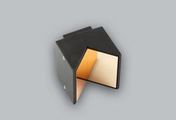Back to Product

|
RM-202
|
||||||||||
|---|---|---|---|---|---|---|---|---|---|---|---|
| Cat. No. | Clear Aperture Width (in/mm) |
Clear Aperture Length (in/mm) |
Accuracy (arc.sec.) |
Mirror Surface Flatness(p.v.633nm) |
Weight (grams) |
Coating | Wavelength Range (nm) | Reflectance | Coating Curve | Diagram | 3D Model |
| RM-202-0.25 | 2.0/51 | 2.0/51 | 0.25 | λ/10 | 285 | - | - | - | |||
| RM-202-0.5 | 2.0/51 | 2.0/51 | 0.5 | λ/10 | 285 | - | - | - | |||
| RM-202-1 | 2.0/51 | 2.0/51 | 1.0 | λ/10 | 285 | - | - | - | |||
| RM-202-2 | 2.0/51 | 2.0/51 | 2.0 | λ/10 | 285 | - | - | - | |||
| RM-202-5 | 2.0/51 | 2.0/51 | 5.0 | λ/10 | 285 | - | - | - | |||
| RM-202-15 | 2.0/51 | 2.0/51 | 15.0 | λ/4 | 285 | - | - | - | |||
Beam Deviation is the maximum deviation from parallelism, expressed in seconds of arc, of any single return beam from any of the 6 sub-apertures of the retroreflector, when the retroreflector is fully-illuminated.
Exiting Wavefront is the resultant maximum peak-to-valley wavefront deformation from a fully-illuminated retroreflector, where lambda = 633nm.
Certain high accuracy models may be heavier than indicated here. Check with us for actual weight.
If you don't see what you need above: